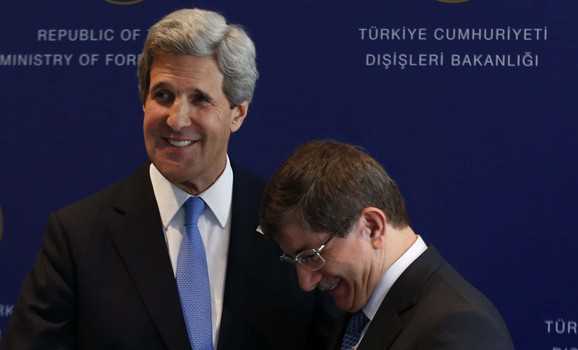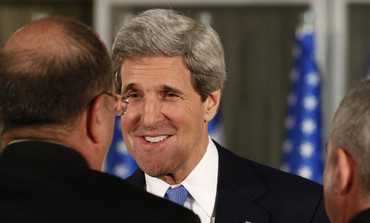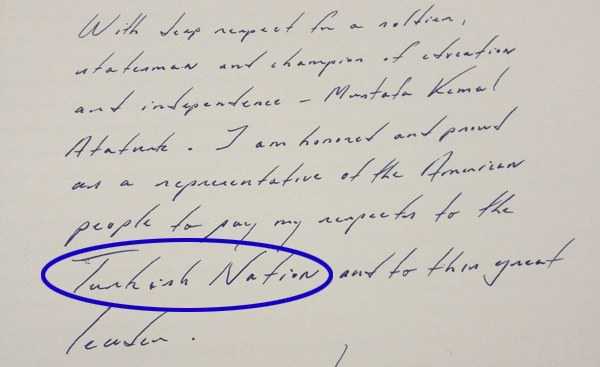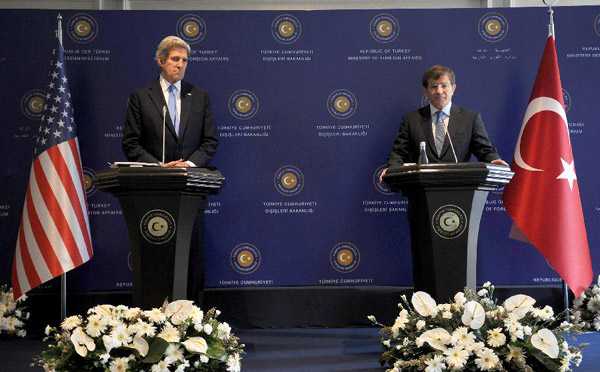
US Secretary of State John Kerry (L) and Turkey’s Foreign Minister Ahmet Davutoglu leave after a joint news conference at Ciragan Palace in Istanbul, April 7, 2013. (photo by REUTERS/Murad Sezer )
By: Mensur Akgun Translated from Haberturk (Turkey).
US Secretary of State John Kerry, during his weekend visit to Istanbul, asked his counterparts to persuade Hamas to opt for peace, according to an April 8 headline in the daily Milliyet.
ABOUT THIS ARTICLE
Summary :
Turkey can play a critical role on Israeli-Palestinian issues through its good relations with Hamas, but Mensur Akgun wonders whether it should do so.
Publisher: Haberturk (Turkey)
Original Title:
To Be Made a Mediator is Not a Favor
Author: Mensur Akgun
First Published: April 9, 2013
Posted on: April 15 2013
Translated by: Timur Goksel
Categories : Turkey Israel Palestinian Authority
If this really was the focus of the visit (that is, if Milliyet’s editors did not run this item on the front page just because it would appear exciting), then the report written by Asli Aydintasbas is important. It could mean that the US will be placing a greater priority on the Palestinian issue than on Syria. This could mean that Washington will move to resolve the Palestine issue in the shadow of the Syrian crisis and put its weight on diplomacy involving Palestine instead of intervening in Syria.
It is not easy to predict what implications this would have for the region and Turkey. Obviously, the US wants Turkey’s support in solving the Palestine issue by using its influence in the region, especially with Hamas.
If Turkey wants to, it can really use its influence. Since the 2009 Davos affair there has been a tremendous sympathy for Turkey in Gaza. The Mavi Marmara flotilla incident and the way Turkey handled reconciliation with Israel has only added to this sympathy.
When necessary, Turkey can convert this sympathy shown in Gaza to political clout and use it toward unification of the two Palestines. The recent victory of Khaled Meshaal over Ismail Haniyeh for the Hamas leadership further strengthened hopes for reconciliation and unification. Also, the US decision to work toward resolving the Palestinian issue after 10 years of no meaningful action will empower Turkey and other regional actors who seek a solution. This also will provide them with further tools of persuasion.
It is now understood that long-dormant Arab peace efforts will be reactivated by the second Obama administration and by the winds of the change in the Arab world.
The US seems to be sincere in wanting to solve the problem and to prevent further destabilization of the region. But is Netanyahu prepared to put an end to the expansion of Jewish settlements and halt new ones? Or will he act as he did Nov. 14 by putting Hamas leaders amenable to a solution on Israel’s target list and shoot them to pieces with its unmanned aerial vehicles?
Will Israel do to Khaled Meshaal what it did to Ahmed Jabari by killing him with missiles in his car? If you ask me, there is no reason for Turkey to become a mediator without getting answers to these questions.
The US has to prove to the region and to the world that it can persuade Israel, that it will not surrender to Israel and that it will not stand idly by when [Israeli Prime Minister Benjamin] Netanyahu comes to Washington and makes statements embarrassing [President Barack] Obama.
Of course Turkey and Israel should reconcile and normalize their relations. Ambassadors should be appointed, trade ties should increase and there should be more community contacts. A two-state solution should be backed; Hamas and Fatah should be assisted in reconciling with help from Qatar and Egypt.
But, without getting meaningful US guarantees and making sure that such guarantees are robust, Turkey should not agree to be a mediator, to be a facilitator to bring the two sides together for peace, to be a front-runner, and use up its credibility in the Arab world when it is not convinced of Israel’s sincerity.
As much as we need that credibility, so does the region and Israel. That is why we have to be careful in using up that credit. Turkey should not disappoint Hamas and, more important, the Arab world.
Turkey doesn’t need the label of a mediator or a facilitator as some tend to think. What is important for Turkey is the stability of the region and its own political standing. It was not easy to achieve this standing. It should not be squandered.
Moreover, we can’t tolerate another period of tension like December 2008 when relations with Israel hit rock bottom. We cannot bear another crisis.
The cost of Israeli opportunism will be too high for everyone at a time when the Arab world is experiencing strong tremors. None of us would like to pay that cost, including the US.
via Kerry’s Request of Turkey May Boost Role as Mediator – Al-Monitor: the Pulse of the Middle East.






